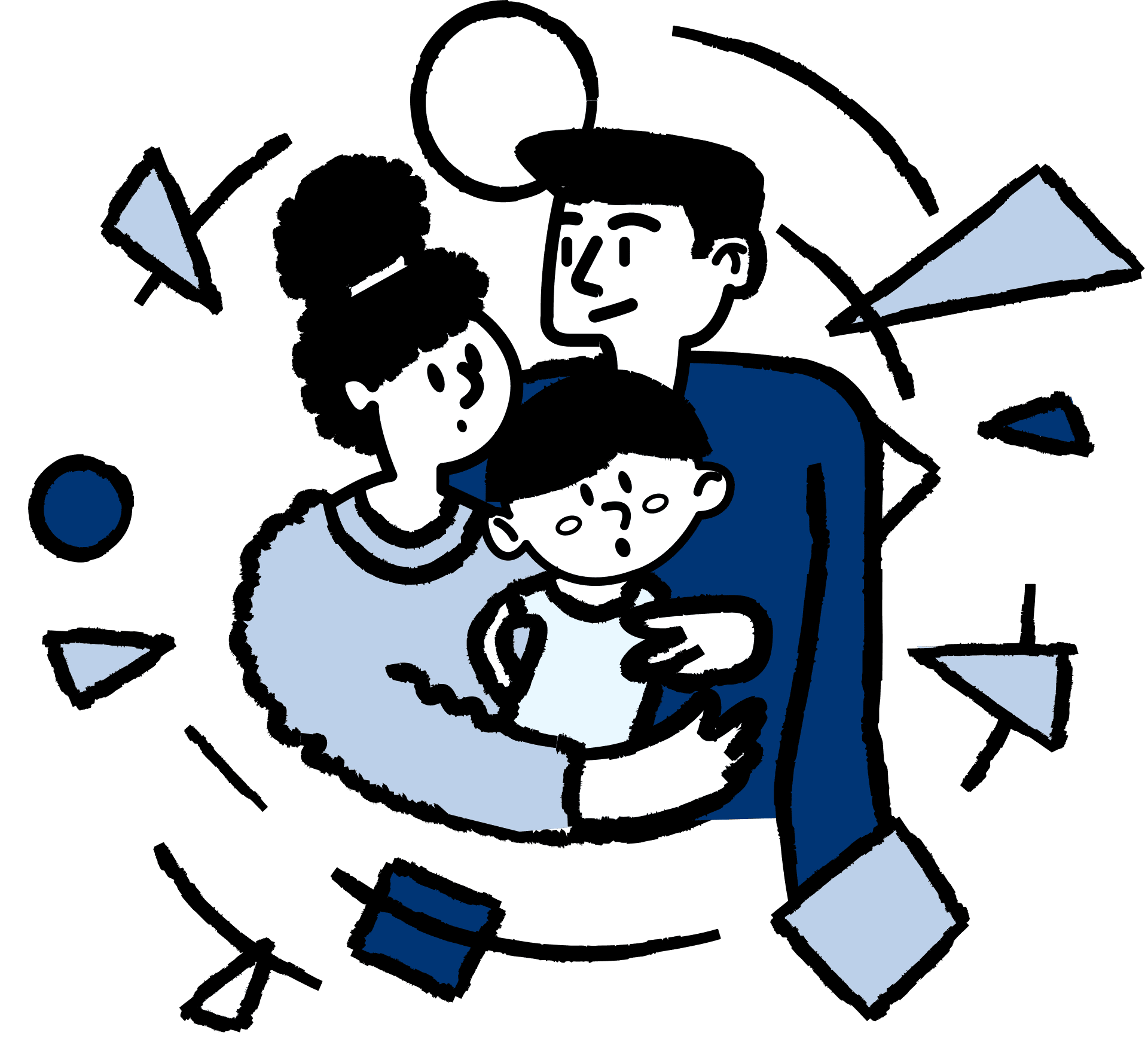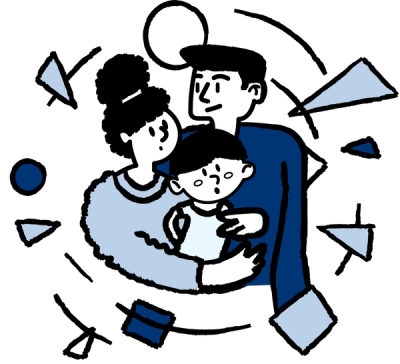Signs and effects of domestic and family violence
Everyone deserves to feel safe, respected, and supported in their relationships.
If you’ve experienced or are experiencing abuse, it can sometimes be hard to even know what that means. That’s why it’s important to be able to recognise what domestic and family violence (DFV) behaviour can look and feel like.
- Why can DFV be hard to see?
Physical abuse like hitting, punching, and choking can be easy to identify, while non-physical abuse can be a lot less obvious because:
- The other person can manipulate situations and emotions to make you doubt your experiences or blame yourself
- The other person's behaviour appears to be accepted in your culture, religion or social circle
- You may have seen the same abusive behaviour modelled in past relationships and think it feels ‘normal’.
Even if you do recognise abuse and violence, it can be hard to accept and admit that it’s actually happening. It’s normal to want your relationship to feel good and work. It’s also normal to feel ashamed or afraid to ask for help.
But remember, there is nothing to be embarrassed about and there are people who can and want to help.
On this page, you’ll find information on:
- Recognising abusive behaviour
- Signs you’re experiencing domestic and family violence
- DFV warning signs in infants and children
- How the cycle of abuse can make you feel trapped
- The impacts and effects of DFV.
Scroll down to learn more.
Recognising abusive behaviour
We all have moments when we get angry, lose our temper or say something we regret. It’s when this behaviour escalates and becomes repetitive that it can turn into domestic and family violence.
If you’re trying to recognise if you or someone you care about is experiencing domestic and family violence, it can be helpful to read about the different types of abuse.
DFV can involve physical abuse, however, it often also involves emotional abuse, coercive control, stalking, tech-based abuse, sexual abuse, financial abuse, spiritual abuse or come in the form of neglect. Almost always, it’s done to maintain power and control over you and to make it difficult to understand and explain what you’re experiencing.
It’s important to remember that the other person may not always start off being abusive. Often, they can start off charming, loving, and supportive. They can also be very good at acting this way in front of other people. When their behaviour changes, it tends to happen behind closed doors or away from others, making it difficult for you to explain what you’re experiencing.
Someone who is abusing you may:
- Act jealous, insecure, and possessive
- Become mistrusting and accusatory
- Constantly criticise the things you say and do
- Insult and humiliate you in front of others
- Blame you or others for their own actions
- Threaten to hurt themselves or take their own life if you leave them
- Get angry, yell, and use profanity
- Deny past events or withhold information
- Control where you can go or who you can see
- Take/hide your (and/or your children’s) ID, passport or birth certificate
- Check your text messages, emails, and call log
- Limit your access to money.
- Common domestic and family violence red flags
A ‘red flag’ is a trait or action of someone that may indicate they might be or become abusive.
- Putting pressure on you to quickly commit, move in together or combine finances
- Expecting you to meet all their needs
- A previous history of being abusive and violent in relationships
- Difficulty holding a job or sticking with plans
- Lack of a social network
- Refusal to wear a condom or practise safe sex
- The tendency to get into verbal or physical fights when out
- Anger and irritability
- Heavy use of alcohol and/or substances
- Debt and gambling problems.
Keep in mind that 'red flags' can be extremely difficult to see when you're experiencing abuse. It is in no way your fault if you can't or didn't see them.
Why do people use abuse and violence?
There are a number of factors that may increase the risk of someone using abuse or violence in their relationships.
For example, they may:
- Use aggression and hostility because they lack problem-solving and communication skills
- Have witnessed abuse as a child or grown up believing that one person should have control over another
- Use violence to exert control or feel more powerful due to having low self-esteem
- Have high levels of financial stress from things like unemployment or a gambling addiction.
The most important thing to know is that if you’re experiencing domestic and family violence, you did not cause this yourself.
It is never the fault of the person being hurt or abused. We all deserve to feel safe, supported, and respected in our relationships and to have access to support.
For more information on what domestic and family violence can look like, visit our types of DFV page.
Being abused is never your fault.
If you feel like you’re experiencing domestic and family violence, you can contact 1800RESPECT (1800 737 732) 24 hours a day, 7 days a week for information and advice.
If that doesn’t feel like an option right now, Lifeline is here via 13 11 14, text, and chat. If life is in danger, call 000.
Signs you're experiencing domestic and family violence
One of the best ways to understand if you’re experiencing domestic and family violence is by going off how you mentally and physically feel. Keep in mind that it’s common to have a range of different emotions, thoughts, and feelings when someone is being abusive towards you.
Some days, you might feel overwhelming sadness and helplessness. On other days, you might feel hopeful and believe things will get better.
Below, we’ve outlined some of the ways you might feel and some of the things you might find yourself doing if you’re in an abusive relationship.
How you might be feeling
Being in an abusive relationship can make you feel:
- On edge, as if something bad is going to happen
- Like you have to walk on eggshells around the other person
- Insecure, inadequate, and like you can’t do anything right
- Lonely, isolated, and like you’re unable to connect with anyone
- Confused about whether or not your feelings and reactions are valid
- Guilty and like you’re to blame for how you’re being treated
- Hopeless that things will or even can ever get better
- Trapped because of overwhelming feelings, financial dependence or fear of putting you and/or your family in further danger.

Changes you might notice in your behaviour
Abuse of any kind can have a big impact on both your emotional wellbeing and physical health.
If you’re experiencing abuse, you might:
- Withdraw from family and friends
- Lose interest in activities you once enjoyed
- Avoid social situations
- Internally downplay or deny what you’re experiencing
- Hide what’s happening from others by defending your abuser, making excuses for their behaviour, covering up injuries, avoiding questions from concerned loved ones, and putting on a ‘happy face’ when in public
- Use harmful coping mechanisms like alcohol and substance misuse and/or self-harm
- Go to extreme lengths to avoid or please the other person in order to stay safe.
Even though we tend to turn to our minds to figure out how we’re feeling, our bodies can also be great indicators that something isn’t right.
- Being abused can cause symptoms like:
- Brain fog and fatigue
- Poor concentration and memory problems
- Sleep problems like difficulty falling or staying asleep
- Anxiety symptoms like being easily startled or constant butterflies in the stomach
- Changes in appetite
- Headaches, stomach pains, and frequent colds
- Chronic health problems such as cardiovascular disease, high blood pressure, diabetes, and autoimmune disorders.
Signs to look out for in infants and children
Even though the impact of abuse may be significant, infants and children don’t always respond in the same ways to stress and trauma that adults do.
If you’re concerned about a child and suspect they might be experiencing domestic and family violence, you can look for visible marks and injuries, as well as the common emotional warning signs listed below.
- A child experiencing and/or witnessing abuse or violence might:
- Be hyper-alert of their surroundings and other people
- Seem constantly fearful, anxious or jumpy
- Experience low self-esteem
- Use aggressive or bullying behaviour
- Refuse to go to school
- Have nightmares or sleep problems
- Withdraw from family and friends
- Struggle to make friends
- Lose interest in activities they once enjoyed
- Have difficulty concentrating
- Avoid or act afraid of going home or to a certain person’s house
- Revert to child-like behaviours like bedwetting or thumb sucking
- Have unexplained injuries.
For a more in-depth look at domestic and family violence warning signs in infants and children by age, you can visit Relationships Australia.
How does DFV impact children in the long term?
A 2023 study found that 2 in 5 Australian children are exposed to DFV.
Research has also shown that exposure to abuse, violence, and an unstable home environment can impact children greatly, even if they aren’t being directly abused.
As a result, a child witnessing domestic and family violence is now recognised as child abuse in some Australian states and territories.
Abusive behaviour in the home can:
- Make children feel stressed and anxious
- Affect how they form and maintain relationships
- Cause children to blame themselves for what’s happening
- Lead to feelings of guilt, shame, and low self-esteem.
The longer children are exposed to domestic and family violence, the greater their risk for ongoing mental health challenges and conditions like post-traumatic stress disorder (PTSD), depression, anxiety, alcohol and substance misuse and self-harm.
It’s not your fault if you and your children are living in an abusive environment. You all deserve support. Remember, leaving may be the safest option for you all.
Help is available.
1800RESPECT (1800 737 732) counsellors are available 24 hours a day, 7 days a week for information and advice. And remember, Lifeline is here via 13 11 14, text, and chat too.
If you’re looking for tips to help someone you care about, visit our DFV information page for friends and family here.
Scroll down to continue learning about the impacts of DFV.
Understanding the cycle of abuse
Abusive relationships tend to follow a confusing and deceptive pattern of behaviour. This can make it extremely difficult to understand what’s happening and explain why it feels so hard to leave.

Often referred to as the cycle of abuse, this pattern consists of four phases and can feel like:
- You’re in the honeymoon stage: In this calm phase, you might get glimpses of the love and respect you deserve. This can look like displays of affection and remorse that may create a false sense of security and like things might change.
- You can sense tension building: You might notice that the other person’s mood changes and that you’re arguing more frequently. Here is where you might feel like you’re walking on eggshells. This phase can be hard to spot and make it hard to leave because the gradual increase in stress and minor incidents of abuse can seem normal after a while, leaving you unsure if there's a real problem.
- There’s an outburst of abuse/violence: When the built-up tension from the previous phase breaks, the abuse and violence escalate and you’re left feeling emotionally or physically in pain or afraid for your safety. This phase can make it hard to leave because the sudden, intense abuse can be shocking and overwhelming, leaving you fearful and feeling trapped.
- Apologies and promises to change are made: In this phase, the other person might apologise for their behaviour and make promises to change. This may leave you feeling emotionally confused and doubting the seriousness of the abuse before you’re back in the honeymoon stage.
This cycle of abuse can happen over and over again. And the more the pattern occurs, the harder it is to break.
Because the other person may have undermined your ability to see that you can break free from the abuse, you might feel stuck, confused, and trapped.
Remember, none of this is your fault, it is possible to break free from the cycle, and there are people who want to help.
Understanding common patterns of behaviours associated with domestic and family violence - like the cycle of abuse - can help you recognise it better.
Visit our DFV short-term help page for more information on how to stay safe and leave an abusive relationship.
The impacts and effects of DFV
Experiencing domestic and family violence can impact and affect every area of your life.
On top of it taking a toll on your mental health and emotional wellbeing, being in an abusive relationship can make it difficult for you to get or hold down a job, raise children in a safe environment, overcome an illness or have healthy relationships with others.
The impact on your other relationships is particularly harmful because being connected to others is what can keep you safe and get you out of an abusive relationship.
- How DFV impacts other relationships
Abusive relationships can affect your connections with other people in your life in the following ways:
- You might be discouraged from seeing friends and family, leading to isolation, loneliness, and reliance on the other person for emotional support
- The betrayal of trust in an abusive relationship can make it hard to believe that other people are good or won’t hurt you
It is common to experience low self-esteem as a result of abuse. This can be a barrier when building new and healthy relationships. You can find out how to improve your self-esteem here.
One of the relationships that domestic and family violence can damage the most is the one you have with yourself. When you experience abuse and violence, it makes sense if your self-esteem feels like it’s not at its best. This is not your fault.
Remember, a key way the other person gains control is by making you feel weak, incapable, worthless, and dependent on them for everything.
“It can be hard to find the strength to leave and heal after an abusive relationship if you don’t feel good about yourself, confident in your abilities or believe that you deserve healthy relationships.”
Low self-esteem can also make it hard to take care of your mental health and wellbeing. While low self-esteem isn’t a mental health condition itself, it can lead to conditions like anxiety, depression, post-traumatic stress disorder (PTSD), and suicidality.
There are ways that you can work on rebuilding your self-esteem and it’s important to do so.






